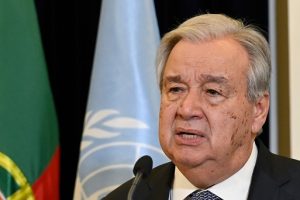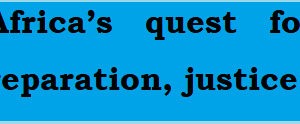BY FITSUM GETACHEW
Addis Ababa may be the capital city of Ethiopia but it is also seat of scores of international agencies such as UNECA, the United Nations Economic Commission for Africa, and many others; but above all it is the seat of the African Union, AU and every year as it is written in the Charter of the AU, once a year the AU summit is held in Addis Ababa. Besides we have seen in the past that whenever there was a need to hold an emergency summit, Addis Ababa has almost always been the preferred destination of African leaders and we have heard from many African leaders that they feel at home in Addis and that it is a pleasure to be hosted in Addis Ababa.
Ethiopia has the huge responsibility of hosting the AU Summit once a year around the end of January or beginning of February. People know very well about this recurrent event and are ready to welcome the guests. But there are several prerequisites that the host country needs to fulfill for the success of the summit. The first important factor in this huge event is the security situation.
Addis Ababa has the solid reputation of being a quiet and peaceful city with relatively few criminal activities compared to several other huge cities in Africa and other cities around the world. Even if lately the economic situation of the city in particular and the country in general may not be among the rosiest, there are no significant rises in criminality that are capable of concerning the guests.
In this regard Addis Ababa can be a comfortable and convenient venue to host such important conferences and that leads inevitably to the booming of conference tourism. Ethiopia has a wonderful record of hosting international events with success and there are no doubts that this as well will be another success.
Already committees have been formed to take care of all the various activities to take place such as the arrangements for the hotels, the logistics, the security situation as well as the sequence of activities beginning with the ministerial and ambassadorial sessions up to the heads of state.
These special committees have the experience of arranging such events and just a few days ago the Deputy Prime Minister and Foreign Affairs Minister Demeke Mekonnen gathered them to assess the already finished activities and what remains to be covered yet or rectified.
This year’s summit is going to be special for Ethiopia because it comes after the conflict in the north has come to a halt and the implementation of the peace accord is underway with an air of peace and stability being breathed. Such atmosphere is very important for such a conference to be held smoothly without any hiccups.
We just experienced the return of hundreds of tourists coming to Ethiopia to attend the Christmas celebrations in Lalibela where hundreds of thousands of people reportedly attended the solemn festivities while more were seen attending the Timket celebrations both in Addis at Jan Meda and others traveled to Gondar in the north where the festivities were carried out with such peaceful atmosphere. This was not thinkable in the past three years first due to the COVID pandemic and then due to the conflict in the north with the negative publicity many international media carried out on Ethiopia.
But now that things seem to have returned to normal all the negative reports on Ethiopia seem to have halted and the country will definitely benefit from it. Even last year there were some pressures not to hold the AU summit in Addis but eventually it was held here and it was another successful event irrespective of the adverse publicity on Ethiopia. This year all that has gone away and finally Ethiopia can host its guests in an atmosphere of peace and harmony.
Addis Ababa is now a huge city with millions of inhabitants. In the past couple of years there have been a continuous flocking of people to the city many escaping instability and risks of violence in their neighborhoods where they used to live, others attracted by the probability of finding jobs in the city. This is of course a phenomenon quite common in other developing countries as well. And it must constitute a huge headache to the city council authorities.
In Ethiopia as well we have heard that the City Administration has been grappling with this issue making it central to its meetings and discussions regarding the problems of the city. Some inhabitants of Addis say they do experience it with their bare eyes while the city continues to swell up with new arrivals or immigrants in search of not only jobs but also shelter and food. Some economics experts say this is also a result of the economic situation of the country with inflation not abating and constituting to be a major challenge for our economists as well as policy makers.
Meanwhile, the government says that it is working round the clock, all year round to come to terms with this uncomfortable situation. We have seen an increase in the number of homeless people engaged in begging on the sidewalks of the streets of Addis, the large squares of Addis and this presents a huge challenge for the city authorities. They have in recent times tried to gather all these people and accord them some sort of shelter and employment but apparently it has not been very successful in decreasing their number. Economists say there is need for short term and long term planning to address this issue successfully.
What is more, there is an increase in construction in the city despite even the rising prices of construction materials some of which are imported. And we can observe that the sidewalks have been invaded by the construction materials such as bricks, sand pebbles, and iron rods necessary for the construction.
Addis already needs many more sidewalks than it has even if lately there has been tremendous progress in this regard with some sidewalks well-constructed inviting for long walks with trees and flowers contributing to the beauty and fresh air of the city. Pedestrians complain the fact that these sidewalks are crowded by the deposit of the constructions materials.
They say they are forced to walk in the main roads where vehicles are supposed to circulate freely. This exposes them to accidents. In discussions about how the city life could be improved carried out on radio programs we have heard engineers advising vigorous measures to be taken by the city administration, the relevant roads authorities and other concerned agencies. They also talked about better articulated planning regarding the way the city must be allowed to expand.
Now that we are bracing up to host the most important event of the year, we clearly need to address the most urgent issues before our image risks to blurred in front of the international community. There is no denial that the country is passing challenging times but we can limit the damage in terms of image and impression. Addis has made tremendous growth during the past few years especially in terms of making the city more inhabitable and pretty, but we should also not forget the negative sides.
There are no doubts that there are many places to visit in Addis such as Unity Park, Friendship Park, Entoto Park, all the newly built streets where pedestrians can enjoy long walks. Then there are the vast Abrehot Library and the Science and Technology Museum and all these could be accessible to the hundreds of journalists who will inevitably invade the city in the event of the AU summit.
Addis residents are very cordial and welcoming and this is well known and witnessed even by foreign tourists. Let us keep our reputation intact and contribute more to the shining image of Ethiopia in Africa. Let us not disappoint any of our guests and behave with our usual courtesy and kindness in all our interactions with the guests. In the end if they are happy with our performance not only will they make nice reportage for the international audience but also think of coming back to see more of Ethiopia and this is what such huge events serve for; attract more people to visit Ethiopia.
It is well known that the government is engaged in preparing three huge projects called the Gorgora Project, the Wonchi Project and the Koyisha Project all three with a huge potential of attracting not only international tourists but also national ones as well because they are all made by taking advantage of the huge natural beauty of the lakes and the green forests that are found around the projects.
Ethiopia’s potential in the tourism field is unbelievably vast and what we just need is exploit it to the maximum and with respect to conference tourism, events such as the AU heads of state conferences are key that inevitably invite other conferences to be held here. Hence the coming AU summit will be valuable in many senses and all of us must do our part to make it a complete success like we have done in the past.
THE ETHIOPIAN HERALD 1 FEBRUARY 2023




